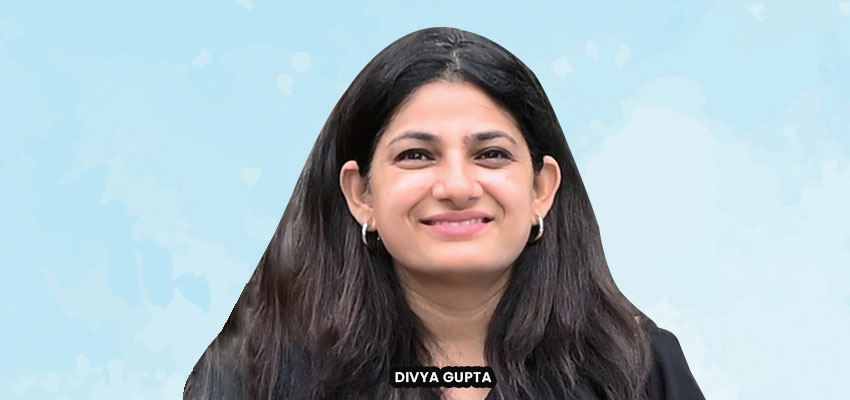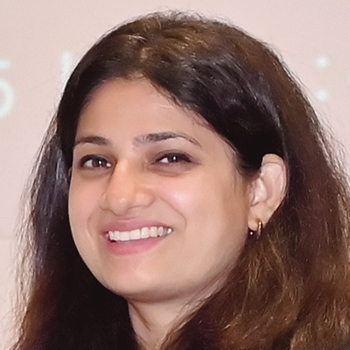Bridging Leadership with Technology

A strategic thinker, Divya Gupta, Country IT Lead, Dyson, is grounded in deep technical expertise forged across diverse sectors like oil and gas, life sciences, retail and consulting giants. A modern technology leader, her journey reflects deliberate exploration and calculated risk-taking. Energised by AI's potential, but vigilant about discerning authentic content, Divya’s advice to aspiring leaders: embrace saying "Yes" to build a foundation enabling strategic "No" later. In an exclusive interview with Corporate Citizen, she talks on how leadership bridges the gap between technology and human, drives innovation through consensus and adaptability, and how it is centred on authenticity, transparency and empowerment
Apivotal early project demanding technical depth and crossfunctional orchestration ignited Divya Gupta’s passion for leadership, inspiring teams and influencing enterprise outcomes. Her PhD in Digital Transformation instilled a structured, analytical mindset, beyond technical knowledge. Analysing real-world case studies taught her to evaluate solutions, through business impact and technical feasibility lenses, considering wider organisational dynamics. This rigour underpins her navigation of relentless technological change, cultivated through continuous learning, networks, and deep dives into disruptive trends
Corporate Citizen: Reflecting on your early career choices, what pivotal moment or decision set you on the path towards technology leadership?
Divya Gupta: When I reflect on my early career choices, it was a period of deliberate experimentation across several distinct paths. I intentionally explored different professional domains to gain clarity on where my genuine interests intersected with my inherent strengths. Concurrently, I consciously implemented a risk mitigation strategy, ensuring that with every significant career move I made, I maintained viable alternative pathways should circumstances change.
The absolutely pivotal moment that solidified my trajectory towards technology leadership materialised, when I took responsibility for a high-stakes project, demanding deep technical proficiency and extensive cross-functional collaboration. Stepping into a role where my contribution shifted from individual execution to guiding an entire team and actively influencing outcomes across multiple departments, was transformative. This experience powerfully underscored the indispensable role of leadership in catalysing genuine technological innovation. It crystallised my passion for technology itself, which ignited my enduring motivation to inspire, mentor and guide others towards achieving ambitious and shared objectives.
"My trajectory towards technology leadership materialised when I took responsibility for a high-stakes project, demanding deep technical proficiency and extensive cross-functional collaboration"
— Divya Gupta
CC: How did your formal education shape your approach to problem-solving in complex IT environments?

Each progressive stage of my formal academic journey significantly deepened my core insights into the IT field, while simultaneously exposing me to cutting-edge emerging trends and illuminating case studies. These studies focused on how pioneering companies successfully leveraged disruptive digital strategies to carve out decisive competitive advantages. This continuous academic and professional immersion fundamentally groomed my approach, instilling a consistently strategic and analytical mindset essential for tackling complex problems.
These cumulative educational experiences meticulously taught me the discipline of deconstructing intricate and multifaceted challenges into smaller, more manageable components. I learned to rigorously appraise potential solutions through the dual, critical lenses of business viability and technical feasibility, while simultaneously cultivating a deep appreciation for the necessity of innovation and operational adaptability. Crucially, during my PhD research, the intensive examination of real-world digital transformation journeys and detailed organisational innovation case studies, trained me to systematically consider the broader organisational impacts and diverse stakeholder perspectives inherent in resolving intricate IT issues. Ultimately, my formal education equipped me with far more than technical knowledge; it provided a structured, rigorously forward-thinking methodology for navigating the perpetually dynamic and rapidly evolving IT landscapes we operate within.
CC: Looking back at your transitions between industries—oil and gas, life sciences, retail and consumer tech, what was the most challenging adaptation?
Reflecting on my transitions across vastly different industries—a journey that also encompassed the sector-agnostic research phase of my PhD—the single steepest challenge I consistently faced was the imperative of rapidly acquiring truly global and deeply nuanced sector-specific expertise. Each transition demanded immersion into entirely new operational paradigms, regulatory environments and market dynamics. Early in my career, this intense exposure proved invaluable, providing critical insights into the unique, often unforeseen hurdles companies encounter when attempting to adopt and integrate genuinely disruptive technologies. It also afforded me the rare opportunity to learn equally from both notable successes and instructive setbacks within each sector, profoundly sharpening my practical understanding of what strategies yield effective results and why others falter. These hard-won lessons remain profoundly instrumental today, directly enabling me to draw upon and strategically apply relevant past experiences when spearheading new, complex initiatives within my current leadership roles.
CC: What core leadership philosophy have you consistently relied on throughout your diverse roles?
My core leadership philosophy rests on the fundamental belief that truly great leaders inspire enduring trust primarily through unwavering transparency and authentic presence in their interactions. By practicing active, empathetic listening, genuinely valuing and incorporating diverse perspectives from all levels, and consistently articulating a clear, compelling vision for the future, I strive to empower every individual to realise and leverage their full potential. This empowerment occurs while simultaneously aligning collective efforts cohesively toward achieving clearly defined, shared organisational objectives. Ultimately, I view leadership not merely as a position of authority, but as a profound responsibility — a responsibility to serve the team, to elevate both individual capabilities and collective performance, and to create measurable, positive impact for both people and tangible business outcomes.
CC: Who were your most influential mentors, and what specific advice do you still apply today?
Throughout the various stages of my career, I’ve been profoundly fortunate to receive invaluable guidance from influential mentors during my tenures at Accenture, Cognizant, Deloitte, and now Dyson. One particularly enduring piece of wisdom, framed through a powerful analogy, conceptualises a fulfilling career trajectory not as a short, frenetic T20 cricket match focused on immediate fireworks, but rather as a strategic, endurance-based Test match. True, sustainable success in this context, they emphasised, demands cultivated patience, inherent adaptability, and a flexible capacity to adapt thoughtfully to changing circumstances over the long term.
My mentors consistently emphasised the paramount importance of maintaining a long-term strategic outlook, committing to relentless continuous learning, regardless of seniority, and demonstrating perseverance, when confronting inevitable setbacks. Their collective counsel serves as a constant reminder to prioritise steady, sustainable growth over time, to base decisions on deliberate thoughtfulness rather than haste, and to invest continuously in building a rocksolid foundational strength and reputation – always favouring enduring substance over the allure of fleeting, superficial victories.
"Maintaining vibrant, active connections within diverse professional networks and fostering regular collaboration with cross-functional teams internally are indispensable practices "
CC: How do you actively cultivate and evolve your technical knowledge and strategic thinking in a rapidly changing field?

Maintaining razor-sharp technical acumen and sophisticated strategic thinking, in such a relentlessly and rapidly evolving field demands proactive, disciplined effort. I prioritise cultivating personal and organisational agility, enabling swift adaptation to genuinely disruptive technologies as they emerge. I actively engage in structured continuous learning, leveraging targeted advanced courses and actively participating in high-level thought leadership forums and industry conferences. Maintaining vibrant, active connections within diverse professional networks and fostering regular collaboration with cross-functional teams internally, are indispensable practices. They provide crucial, varied perspectives and facilitate the early recognition of nascent trends. Additionally, I dedicate significant time to studying evolving global business strategies and meticulously dissecting detailed case studies of organisations that are demonstrably excelling in navigating their own complex digital transformation journeys.
CC: Based on your cross-industry experience, what common misconception about IT leadership do you encounter most often?
Based on my extensive experience working across numerous industries, serving both as an in-house IT leader within large enterprises and as an external consultant advising them—one particularly prevalent misconception persists. Many stakeholders erroneously believe that the primary, perhaps sole, responsibility defining a successful IT leader is being an exceptionally strong, hands-on technical expert. However, my experience unequivocally demonstrates that truly exceptional IT leadership fundamentally transcends mere technical proficiency. Truly effective leaders at this level must also master the nuanced art of stakeholder management: this involves proactively building robust, trust-based relationships across the organisation and strategically securing genuine alignment and buy-in from diverse cross-functional heads and business unit leaders. This critical ability to bridge ambitious technological vision with hard-won organisational consensus is very often the decisive factor, separating successful digital initiative launches that achieve enterprise-wide adoption and tangible value from those that ultimately stall or fail.
CC: What emerging technology trend excites you most for its potential to reshape enterprises in the next decade?
Without question, AI stands out as the most exhilarating and potentially transformative technological trend on the horizon. Moving well beyond its current ubiquitous buzzword status, there exists profound, widespread curiosity and anticipation about how AI capabilities will ultimately evolve, mature, and fundamentally reconfigure core business processes and large-scale enterprise operations, over the coming decade. I am particularly eager to witness first-hand how ongoing and future advancements in AI will dynamically transform organisational workflows, decision-making paradigms, and the very nature of competitive dynamics across global industries.
CC: What key skills or mindset will be essential for technology leaders to succeed 5–10 years from now?
Looking ahead 5-10 years, one of the most indispensable skills or core mindsets for technology leaders will undoubtedly be the cultivated ability to remain exceptionally agile and highly adaptable within an ever-shifting technological and business landscape. Equally critical will be developing the capacity to deeply understand how emerging IT innovations, especially genuinely disruptive technologies, will fundamentally reshape, redefine and transform, established business processes and operating models. Future success will fundamentally hinge on proactively embracing inevitable change, cultivating foresight, and continuously anticipating how nascent technologies can be harnessed to drive tangible, measurable business value, impacting either top-line revenue growth or bottom-line operational efficiency and cost reduction.
CC: How do you balance deep technical expertise with the broader strategic vision required of a CIO level role?
Successfully balancing credible technical expertise with the expansive, long-term strategic vision demanded of a CIO-level role, hinges critically on developing the ability to seamlessly connect specific technology decisions and investments directly to overarching business goals and corporate strategy. Whenever an organisation contemplates implementing a potentially disruptive technology or evaluating a significant new digital initiative, it is absolutely essential to rigorously assess its potential longterm benefits through a business outcome lens. This means concretely evaluating how the technology could demonstrably boost sales, significantly lower operational costs, meaningfully enhance customer or employee experience, or mitigate critical risks. Maintaining both, a robust technical foundation that commands respect and a clear, holistic view of the bigger organisational picture, empowers technology leaders to make informed, strategically sound choices that consistently yield meaningful, positive business outcomes.
"Future success will fundamentally hinge on proactively embracing inevitable change, cultivating foresight, and continuously anticipating how nascent technologies can be harnessed"
CC: From your vantage point, what major challenge facing the global tech industry keeps you awake at night?

From my current vantage point, one major challenge that increasingly keeps me awake at night is the rapidly escalating difficulty in reliably distinguishing authentic, humangenerated content and interactions from increasingly sophisticated AI-generated fabrications. While AI undoubtedly offers immense, transformative advantages across countless domains, we as IT leaders and as a society, still critically lack robust, scalable methods to definitively verify the authenticity of digital information, especially as AI-generated synthetic content becomes indistinguishable from reality. Developing trustworthy, accessible capabilities to accurately discern genuine information from fabricated material is now an issue of critical urgency—an imperative challenge that the entire global tech industry must collectively prioritise and address decisively as we move forward into an increasingly AI-integrated future.
CC: What advice would you give your younger self, starting out in technology and business?
If I could offer advice to my younger self embarking on a career in technology and business, it would be this: embrace the habit of saying 'yes' far more frequently, especially during those formative early career years. Say yes enthusiastically to mastering complex new technologies, even outside your initial comfort zone. Say yes to tackle diverse, challenging projects that stretch your capabilities. Say yes to collaborate proactively with cross-functional teams, building bridges across organisational silos. And, most crucially of all, say yes wholeheartedly to actively seeking, welcoming, and internalising constructive feedback—this is the fuel for rapid growth. By consciously maintaining this high level of openness and proactively accumulating a rich tapestry of diverse experiences, adopting an almost strategic 'greediness' for valuable opportunities, you systematically build an exceptionally formidable professional foundation. This robust foundation later empowers you to make far more discerning, confident choices, where the ability to strategically say 'no' becomes just as vital a skill as knowing precisely when and why to say 'yes'.